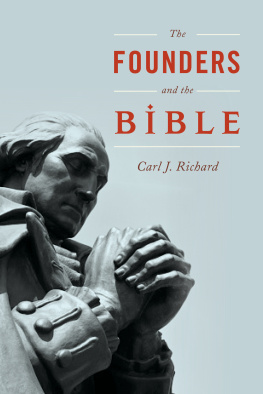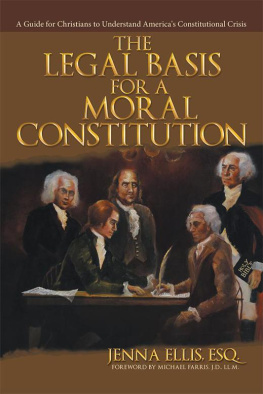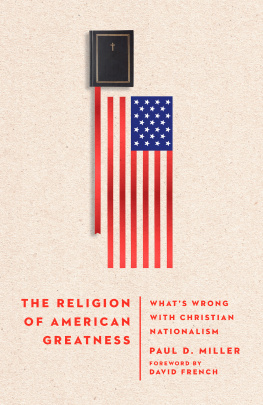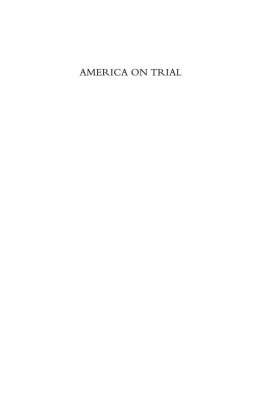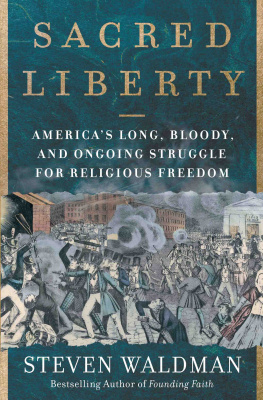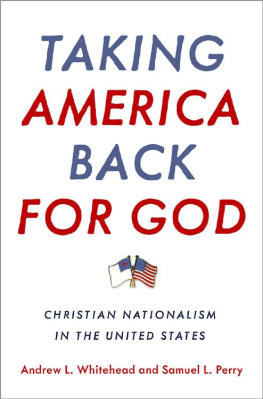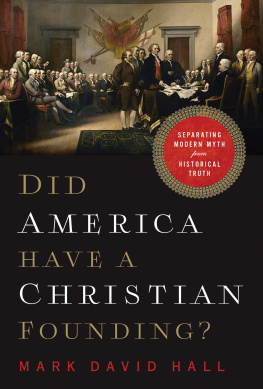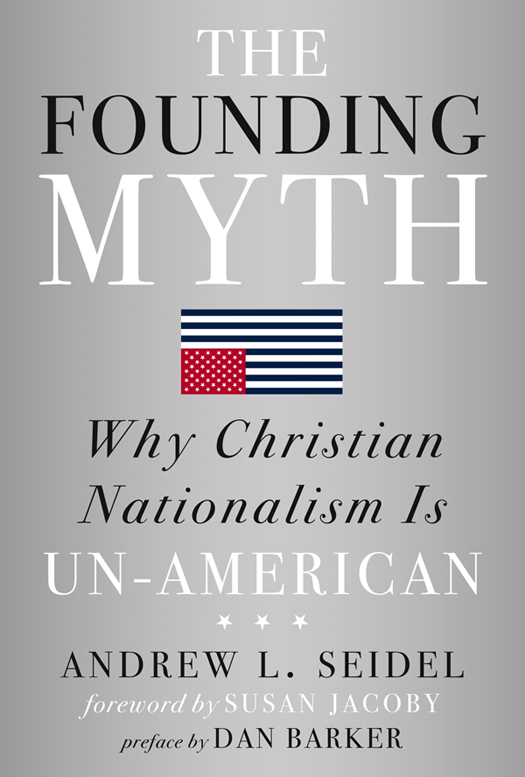This book required serious help, and I owe many my thanks. Most importantly, to my family, especially Elizabeth, Oliver, and Simon, thank you for your love and support. Elizabeth taught me to write well, read countless drafts, offered unflinching criticism, and was exceedingly patient and supportive. I love you. To Mom and Wally, Dad and Liz, Jessie and Sean, and Aunt Missy for their love and support. And to friends for the same, you know who you are.
To those who preferred not to be or arent named. You know who you are. Thank you.
As with nearly all authors, I owe a debt to many better thinkers and writers. To Christopher Hitchens, whose Vanity Fair article revising the Ten Commandments inspired part of this book. He took the time to do a writer hed never met a favor. I miss his pen.
1
Interesting and Irrelevant, the Religion of the Founders
The foundation of our Empire was not laid in the gloomy age of Ignorance and Superstition, but at an Epoch when the rights of mankind were better understood and more clearly defined, than at any former period.
George Washington circular, June 8, 1783
Washington, you know is gone! announced Mason Locke Weems, an Episcopal priest, to his Philadelphia publisher. The indecent glee of Weemss exclamation point was matched by the unseemly haste with which he wrote, penning his note in mid-January, a month after Washingtons death on December 14, 1799.
In that exclamatory note, Weems told his publisher: Millions are gaping to read something about him. I am very nearly prim[e]d & cock[e]d for em. Weems was interested in profit, not accuracy.
When Weems published A History of the Life and Death, Virtues and Exploits of General George Washington in 1800, it was a commercial
By the seventeenth edition, another Weemsian fable was added: General Washington praying in the Valley Forge snow.
The story was repeated and reprinted with no regard for truth; its proliferation accelerated during the nations religious revival from 1820 to 1860. That revival, referred to as the Second Great Awakening, was itself an indication that the founding generation was not as religious as Christian nationalists often argue: only those who are asleep can awaken.
For decades, Americas best-selling school textbooks, the McGuffey Readers, edited by educator William Holmes McGuffey (and later reprinted by Henry Ford), included the Valley Forge story, ensuring that it would be read by millions of children. McGuffeys work led to other displays of Washingtons conjured piety.
The Valley Forge prayer scene has been painted by Lambert Sachs (c. 1854); Henry Brueckner (c. 1866); J. C. Leyendecker (1935); and Arnold Friberg (1975). It appeared on stamps in 1928 and in 1977. The George Washington Memorial Chapel was founded in Valley Forge in 1903 partly to commemorate the inspiring image of a solitary and steadfast Washington kneeling in the snow at Valley Forge.
For all its ubiquity, there is no historical evidence to support the tale. Weems designed the story to portray a devout Washington. In Lengels enlightening book Inventing George Washington, he writes, Over and again, Weems emphasized Washingtons Christian upbringing, frequent prayers, and spiritual dependence on God.
On the rare occasions when Washington actually attended church (perhaps twelve times a year pre-presidency and only three times in his last three years), Washington refused to take communion, even though his wife did.
Washington refused to have a priest or religious rituals at his deathbed, a startling lapse if he were truly devout. As historian Joseph Ellis put it, there were no ministers in the room, no prayers uttered, no Christian rituals offering the solace of everlasting life. He died as a Roman stoic rather than a Christian saint.
If he was religious, Washington was exceedingly private about those beliefs, even in personal letters and papers. He mentions Jesus perhaps once in ninety volumes of letters and papers, and never in private correspondence.Ron Chernow, Washingtons Pulitzer Prizewinning biographer, notes in Washington: A Life:
Some of Washingtons religious style probably reflected an Enlightenment discomfort with religious dogma, but it also reflected his low-key personal style. He was sober and temperate in all things, distrusted zealotry, and would never have talked of hellfire or damnation. He would have shunned anything, such as communion, that might flaunt his religiosity. He never wanted to make a spectacle of his faith or trade on it as a politician. Simply as a matter of personal style he would have refrained from the emotional language associated with evangelical Christianity. This cooler, more austere religious manner was commonplace among well-heeled Anglicans in eighteenth-century Virginia.
One of the many interpretations of the Valley Forge prayer story: a lithograph by Frederick Heppenheimer titled Washington at Valley Forge, c. 1853.
The prayer story, as historian Franois Furstenberg notes, almost certainly sprung from Weemss imagination. This facile, reflected glory is why the fraudulent scene hangs in the Capitol prayer room, why Reagan gushed over a lie, and why all a politician need do is claim to be a prayerful Christian and he is suddenly Washingtons equal.
Weemss salvo began a long written war between authors and historians over the founders religiosity. George Washington, Benjamin Franklin, Thomas Jefferson, John Adams, James Madison, and others are invoked in the attempt to claim this nation as Christian because they were Christian. This spiritual wrangling has a checkered history, with each generation repeating the falsehoods of the earlier, including Weemss.
Though interesting, the battle over what the founders personally believed is irrelevant to the claim that our nation was founded on Judeo-Christian principles. That the founders had personal beliefs about religion and god does not prove that they used those principles to found a nation. Nor should we make the mistake of assuming that their religious beliefs were static throughout their lives. Peoples beliefs change. Two of my good friends, authors Dan Barker and Jerry Dewitt, were once preachers and are now atheists. It is unlikely that at age fifty-eight Washington had the same beliefs hed held at eighteen. Even were we to concede, for the sake of argument, that the founders were all Christian, the logic required to prove the Christian nationalist argument is flawed:


